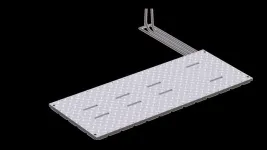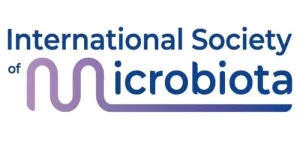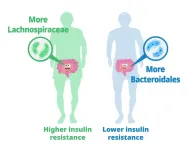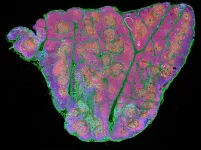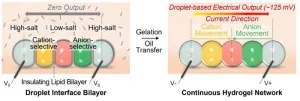(Press-News.org) The same neurons that help bats navigate through space may also help them navigate collective social environments, finds a new study published today in the journal Nature.
Many mammals — including bats and humans — are believed to navigate with the help of a brain structure called the hippocampus, which encodes a mental “map” of familiar surroundings. For example, as you walk around your neighborhood or commute to work, individual “place” neurons in the hippocampus fire to indicate where you are.
In the new study, researchers at the University of California, Berkeley, used wireless neural recording and imaging devices to “listen in” on the hippocampal brain activity of groups of Egyptian fruit bats as they flew freely within a large flight room — often moving among tightly clustered social groups — while tracking technology recorded the bats’ movements.
The researchers were surprised to find that, in this social setting, the bat’s place neurons encoded far more information than simply the animal’s location. As a bat flew toward a landing spot, the firing of place neurons also contained information about the presence or absence of another bat at that spot. And when another bat was present, the activity of these neurons indicated the identity of the bat they were flying toward.
“This is one of the first papers to show identity representation in a non-primate brain,” said study senior author Michael Yartsev, an associate professor of bioengineering and neuroscience at UC Berkeley. “And surprisingly, we found it in the hub of what was supposed to be the brain’s GPS. We found that it still acts as a GPS, but one that is also tuned to the social dynamic in the environment.”
While not as visually stunning as a school of fish or a murmuration of birds, highly social animals like humans and bats also exhibit forms of collective behavior, said study first author Angelo Forli, a postdoctoral fellow in Yartsev’s NeuroBat lab.
“Social animals, like humans, will coordinate in space to achieve different goals,” Forli said. “It might be just visiting others. It might be moving together, as in the case of classical collective behaviors or playing a soccer match. Or it might be other forms of cooperation or conflict.”
Due to the complexity of the experiment, Forli initially had doubts about whether allowing groups of bats to fly and interact freely would yield results about the neural basis of collective behavior. He was concerned that the movements of the bats and their social interactions might be too random to uncover robust relationships between their neural activity and their behavior.
So he was pleasantly surprised when the bats spontaneously established a handful of specific resting spots within the flight room and followed very similar trajectories when traveling among them. The bats also showed strong preferences for flying toward specific “friend” bats, often landing very close to or even on top of each other.
“We found that if you put together a small group of bats in a room, they would not actually behave randomly, but would show precise patterns of behavior,” Forli said. “They would spend time with specific individuals and show specific and stable places where they liked to go.”
These precise patterns of behavior allowed Forli to identify not only the neural activity associated with different flight trajectories, but also how the neural activity changed depending on the identity of the bat present at the target location and the movements of other bats.
“By recording just a handful of those neurons from this brain structure, we can really know what the bats were doing in their social space,” Yartsev said. “We could find out if they were going to an empty location or to a location where there were other individuals, which is really surprising.”
In recent years, Yartsev and his NeuroBat Lab have used a variety of wireless neural recording devices and flight tracking technologies to uncover a number of surprising details about the brain, including how bats’ neural activity syncs up while they socialize; how activity in the frontal cortex helps bats identify self vs. others during vocal interactions; how bats’ hippocampus maps not only specific locations, but full flight trajectories; and even how stable spatial memories might be stored in the brain.
This new study brings together the team’s work on navigation and social behavior, showing how these two things are fundamentally intertwined within the brain. The findings also help illuminate why damage to the hippocampus in humans has been linked to both social and spatial aspects of memory loss in neurodegenerative diseases like Alzheimer’s.
“Our episodic memories are a combination of the environment where we are located and our experiences within it — including, of course, our social experiences,” Yartsev said. “Our results are surprising, in the sense that no one has observed this connection before in groups of animals and at the individual neuron level. But they also make sense in that they are very consistent with deficits that people with damage to the hippocampus experience.”
Finally, this study highlights a very important point, Yartsev said. While most of the neuroscientific community examines the brain under “simplified” or “artificial” conditions that are often far removed from the natural behavior the brain has evolved to promote, this work demonstrates the power of the natural approach to neuroscience research.
“For half a century, people have been studying place neurons, but 99% of that work has been done in single animals moving in an empty box,” Yartsev said. “Our findings suggest that there is a lot that can be learned when neuroscience research focuses on natural behavior.”
This research was supported by the New York Stem Cell Foundation (NYSCF-R-NI40), the National Institute of Mental Health (Award 1-R01MH25387-01), the Air Force Office of Scientific Research (FA9550-17-1-0412), the Packard Fellowship (2017-66825), the National Institute of Neurological Disorders and Stroke (R01NS118422-01), the Vallee Foundation (VS-2020-34), the Office of Naval Research (N00014-21-1-2063), the Searle Scholars Program (SSP-2016-1412), the Human Frontiers Fellowship (LT000302/2020) and the European Molecular Biology Organization (1022-2019).
END
Bat study reveals how the brain is wired for collective behavior
The same neurons that help bats navigate through space may also help them navigate social environments
2023-08-30
ELSE PRESS RELEASES FROM THIS DATE:
IHT Group to manufacture, sell hog-cooling technology developed at Purdue
2023-08-30
WEST LAFAYETTE, Ind. and WINNIPEG, Manitoba – IHT Group, a division of Decisive Dividend Corp. (TSXV: DE) based in Winnipeg, Manitoba, is bringing patented cooling pad technology for hogs to the North American market in spring 2024.
The pads are 2-foot-by-4-foot aluminum tread plates on top of copper pipes that circulate water. Sensors in the pads determine if the hog is too hot and circulate new water to keep the pad cool. The technology was designed by researchers in Purdue University’s Department of Agricultural and Biological Engineering and Department of Animal Sciences.
Heat harms hogs
Record heat across North America ...
T-cells infiltrate brain, cause respiratory distress in condition affecting the immunocompromised
2023-08-30
CHAMPAIGN, Ill. — When an immunocompromised person’s system begins to recover and produce more white blood cells, it’s usually a good thing – unless they develop a potentially deadly inflammatory condition. New research from the University of Illinois Urbana-Champaign has found that the pulmonary distress often associated with the condition is caused not by damage to the lungs, but by newly populated T-cells infiltrating the brain.
Knowing this mechanism of action can help researchers and ...
The International Society of Microbiota will host a symposium dedicated to clinicians on probiotics and microbiota supplements applications in diseases
2023-08-30
Venice, Italy – The International Society of Microbiota (ISM) is pleased to announce the upcoming symposium on probiotics and microbiota supplements. The symposium will take place on October 17, 2023, in Venice, Italy, one day prior to the 10th World Congress on Targeting Microbiota 2023.
About ISM 2023 Symposium:
The symposium will focus on the strain specificity of probiotics and microbiota supplements and their clinical applications for disease management. It will also elaborate on the use and mode of action of postbiotics and metabolites like the SCFA butyrate.
Speakers will present the latest research on the use of probiotics to treat a variety ...
American Meteorological Society announces 2024 weather, water, and climate honorees
2023-08-30
[Boston, MA, USA—August 30, 2023] Each year, the American Meteorological Society recognizes outstanding individuals and organizations in the weather, water, and climate community through its Awards and Honors program. The organization is proud to announce its 2024 recipients, who will receive their award or honor at the 104th AMS Annual Meeting in Baltimore, Maryland, 28 January–1 February, 2024.
“Working across a wide range of sciences and services, the members of our community are vital to upholding safety and quality of life in the United States and across ...
Do driverless cars feel safe? New study shows gradual introduction needed to build comfort among all road users
2023-08-30
While self-driving vehicles (SDVs) are being hailed as a solution for safer, more efficient roads, new research suggests British Columbians are not quite ready to embrace self-driving cars wholeheartedly – and will need a period of gradual transition before adoption.
The study, conducted by the Research on Active Transportation Lab (REACT) at the University of British Columbia, reveals mixed perceptions of automated vehicles, particularly their effects on pedestrian comfort and safety.
Do self-driving cars feel safe?
Four out of 10 participants (41 per cent) thought that pedestrians faced reduced safety and comfort levels ...
MD Anderson research highlights for August 30, 2023
2023-08-30
HOUSTON ― The University of Texas MD Anderson Cancer Center’s Research Highlights showcases the latest breakthroughs in cancer care, research and prevention. These advances are made possible through seamless collaboration between MD Anderson’s world-leading clinicians and scientists, bringing discoveries from the lab to the clinic and back.
Recent developments include a novel computational tool to detect single base pair DNA changes in single-cell sequencing data, a potential target to treat hypertension caused by drugs commonly used in organ transplants, further insights into the steps involved in ...
Study finds high blood and urinary metal levels among exclusive marijuana users
2023-08-30
Research conducted at Columbia University Mailman School of Public Health detected significant levels of metals in the blood and urine among marijuana users, concluding that marijuana may be an important and under-recognized source of lead and cadmium exposure. This is among the first studies to report biomarker metal levels among marijuana users and most likely the largest study to date, that links self-reported marijuana use to internal measures of metal exposure, rather than just ...
Bacteria treatment reduces insulin resistance, protects against diabetes
2023-08-30
Researchers led by Hiroshi Ohno at the RIKEN Center for Integrative Medical Sciences (IMS) in Japan have discovered a type of gut bacteria that might help improve insulin resistance, and thus protect against the development of obesity and type-2 diabetes. The study, published August 30 in the scientific journal Nature, involved genetic and metabolic analysis of human fecal microbiomes and then corroborating experiments in obese mice.
Insulin is a hormone released by the pancreas in response to blood sugar. Normally, it helps get the sugar ...
Researchers identify stem cells in the thymus for the first time
2023-08-30
Francis Crick Institute press release
Under strict embargo: 16:00hrs BST 30 August 2023
Peer reviewed
Experimental study
Cells
Researchers identify stem cells in the thymus for the first time
Researchers at the Francis Crick Institute have identified stem cells in the human thymus for the first time. These cells represent a potential new target to understand immune diseases and cancer and how to boost the immune system.
The thymus is a gland located in the front part of the chest, the place where thymocytes (the cells in the thymus) mature into T ...
New ‘droplet battery’ could pave the way for miniature bio-integrated devices
2023-08-30
UNDER EMBARGO UNTIL 16:00 BST / 11:00 ET WEDNESDAY 30 AUGUST 2023
Researchers have developed a miniature battery that could be used to power tiny devices integrated into human tissues.
The design uses an ionic gradient across a chain of droplets – inspired by how electric eels generate electricity.
The device was able to regulate the biological activity of human neurons.
This could open the way to the development of tiny bio-integrated devices, with a range of applications in biology and medicine.
University of Oxford researchers have made a significant step towards realising miniature ...
LAST 30 PRESS RELEASES:
Scientists identify smooth regional trends in fruit fly survival strategies
Antipathy toward snakes? Your parents likely talked you into that at an early age
Sylvester Cancer Tip Sheet for Feb. 2026
Online exposure to medical misinformation concentrated among older adults
Telehealth improves access to genetic services for adult survivors of childhood cancers
Outdated mortality benchmarks risk missing early signs of famine and delay recognizing mass starvation
Newly discovered bacterium converts carbon dioxide into chemicals using electricity
Flipping and reversing mini-proteins could improve disease treatment
Scientists reveal major hidden source of atmospheric nitrogen pollution in fragile lake basin
Biochar emerges as a powerful tool for soil carbon neutrality and climate mitigation
Tiny cell messengers show big promise for safer protein and gene delivery
AMS releases statement regarding the decision to rescind EPA’s 2009 Endangerment Finding
Parents’ alcohol and drug use influences their children’s consumption, research shows
Modular assembly of chiral nitrogen-bridged rings achieved by palladium-catalyzed diastereoselective and enantioselective cascade cyclization reactions
Promoting civic engagement
AMS Science Preview: Hurricane slowdown, school snow days
Deforestation in the Amazon raises the surface temperature by 3 °C during the dry season
Model more accurately maps the impact of frost on corn crops
How did humans develop sharp vision? Lab-grown retinas show likely answer
Sour grapes? Taste, experience of sour foods depends on individual consumer
At AAAS, professor Krystal Tsosie argues the future of science must be Indigenous-led
From the lab to the living room: Decoding Parkinson’s patients movements in the real world
Research advances in porous materials, as highlighted in the 2025 Nobel Prize in Chemistry
Sally C. Morton, executive vice president of ASU Knowledge Enterprise, presents a bold and practical framework for moving research from discovery to real-world impact
Biochemical parameters in patients with diabetic nephropathy versus individuals with diabetes alone, non-diabetic nephropathy, and healthy controls
Muscular strength and mortality in women ages 63 to 99
Adolescent and young adult requests for medication abortion through online telemedicine
Researchers want a better whiff of plant-based proteins
Pioneering a new generation of lithium battery cathode materials
A Pitt-Johnstown professor found syntax in the warbling duets of wild parrots
[Press-News.org] Bat study reveals how the brain is wired for collective behaviorThe same neurons that help bats navigate through space may also help them navigate social environments
